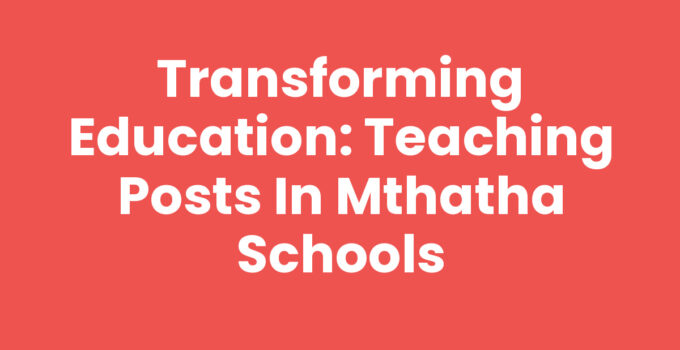The educational landscape in Mthatha is evolving, and teaching posts in Mthatha schools are becoming key drivers of this transformation. As the demand for quality education grows, educators are on the lookout for innovative teaching methods, tools, and practices that not only engage students but also prepare them for the challenges of the future. In this blog post, we explore teaching posts in Mthatha schools and discuss their importance, challenges, and potential impact.
Teaching Posts In Mthatha Schools: A Step-by-Step Guide
The teaching posts in Mthatha schools are diverse and cater to the various needs of the students and the curriculum. Creating a well-rounded educational experience requires understanding the core components of effective teaching. Here is a step-by-step guide on how to approach teaching posts in Mthatha schools:
- Understand the Curriculum: Start by familiarizing yourself with the curriculum adopted by the Mthatha schools. Each institution may have specific guidelines that define pedagogical strategies and assessment methodologies. This foundational knowledge is crucial.
- Get Involved with Community Engagement: Establishing strong ties with the community is essential. Community stakeholders can provide valuable insights into local educational needs and expectations.
- Adapt Teaching Styles: Mthatha schools often see diverse classrooms with varied learning styles. Educators should adopt flexible teaching methods to cater to visual, auditory, and kinesthetic learners.
- Incorporate Technology: Leverage technology to enhance learning experiences. Utilizing digital tools can make lessons more interactive and engaging for students.
- Focus on Continuous Professional Development: As an educator, it’s important to continue learning. Attend workshops, webinars, and courses that focus on teaching innovations and methodologies.
- Encourage Collaborative Learning: Create opportunities for students to work together. Group projects and peer feedback sessions can enhance understanding and lead to deeper learning experiences.
- Assess and Adapt: Regularly assess student progress and adapt your teaching strategies accordingly. Being responsive to students’ needs is key to effective teaching.
By following these steps, educators can effectively contribute to the teaching posts in Mthatha schools, fostering an environment that values learning and development.
The Benefits of Teaching Posts in Mthatha Schools
Teaching posts in Mthatha schools are vital for various reasons:
- Quality Education: Well-structured teaching posts ensure that students receive a quality education that meets educational standards while also addressing their personal growth.
- Preparation for Higher Education: Strong teaching practices prepare students for further studies by building critical thinking and problem-solving skills.
- Community Development: Education goes beyond the classroom. Teaching posts help uplift communities by equipping the youth with skills necessary for their future endeavors.
Challenges Faced in Teaching Posts in Mthatha Schools
Despite the importance of teaching posts, there are challenges that educators may face:
- Resource Limitations: Many schools in Mthatha struggle with insufficient teaching materials and resources, which can hamper effective teaching.
- High Student-to-Teacher Ratios: Large class sizes can lead to inadequate student attention and hinder personalized learning experiences.
- Resistance to Change: Some educators may be hesitant to adopt new teaching methodologies, which can limit innovation and growth in teaching practices.
Understanding these challenges is vital for educators and school administrators alike to find effective solutions and continuously improve the quality of education.
In conclusion, teaching posts in Mthatha schools are not just positions within an educational institution; they are critical roles that influence the future of students and the community. By embracing modern teaching practices, continuous learning, and community involvement, educators can make a significant impact on the lives of their students.
Frequently Asked Questions
What qualifications are needed to apply for teaching posts in Mthatha schools?
Typically, a teaching degree and relevant experience or certification are required, along with specific qualifications depending on the subject taught.
How can teachers stay updated with teaching practices in Mthatha?
Participating in workshops, professional networks, and local teacher meetings can help educators keep up-to-date with current teaching methods.
What challenges do teachers face in Mthatha schools?
Common challenges include resource limitations, large class sizes, and sometimes resistance to adopting new educational practices.









